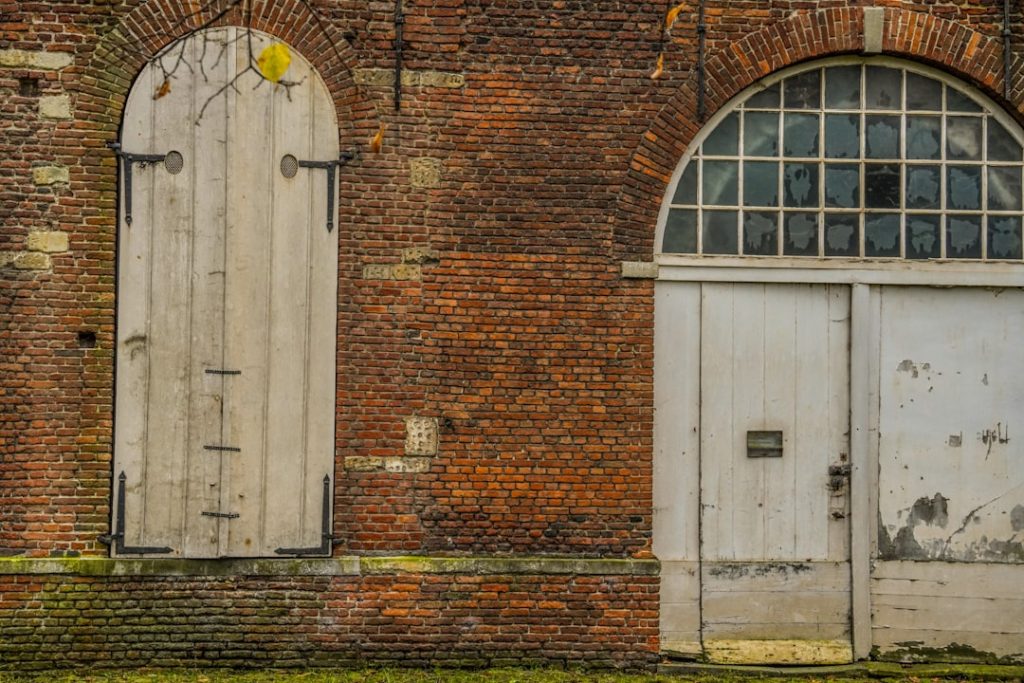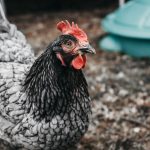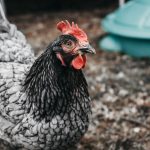Keeping the gate to a chicken enclosure closed is crucial for multiple reasons. Primarily, it ensures the safety and security of the chickens by preventing predators such as foxes, raccoons, and dogs from entering the enclosure. It also stops chickens from wandering into potentially dangerous areas like busy roads or neighboring properties.
Maintaining a closed gate helps preserve the cleanliness and order of the chicken enclosure. Chickens are naturally curious and exploratory, and if allowed to roam freely, they may cause damage or create messes in gardens or other areas of the property. A closed gate controls the chickens’ access to certain areas and establishes clear boundaries for their designated space.
This practice also helps minimize potential conflicts with other pets or animals on the property by reinforcing the idea that the enclosure is the chickens’ specific area. Overall, keeping the gate closed is an essential aspect of responsible chicken keeping that promotes the health, safety, and well-being of the flock while maintaining order on the property.
Table of Contents
- 1 The Persuasive Tactics of Chickens
- 2 Potential Consequences of Leaving the Gate Open
- 3 Strategies for Resisting the Chickens’ Influence
- 4 The Responsibility of Chicken Owners
- 5 Creating a Secure Chicken Enclosure
- 5.1 Creating a secure chicken enclosure is crucial for the safety and well-being of your flock. This involves investing in high-quality fencing that is tall enough to prevent chickens from flying over it and sturdy enough to withstand attempts at digging or pushing through. Additionally, it is essential to regularly inspect the perimeter of the enclosure for any potential weak spots or damage that could compromise its security.
- 5.2 A Well-Designed Environment: Key to Happy and Healthy Chickens
- 5.3 Minimizing the Desire to Escape
- 6 Maintaining Discipline in Chicken Care
- 7 FAQs
- 7.1 What is the importance of keeping the gate closed for chickens?
- 7.2 What are the potential risks of leaving the gate open for chickens?
- 7.3 How can keeping the gate closed benefit the overall management of a chicken farm or coop?
- 7.4 What are some common reasons that chickens may try to persuade people to leave the gate open?
- 7.5 What are some effective strategies for ensuring that the gate remains closed despite the chickens’ protests?
Key Takeaways
- Keeping the gate closed is crucial for the safety and security of the chickens and the surrounding area.
- Chickens use persuasive tactics such as clucking and pecking to influence humans to open the gate.
- Leaving the gate open can lead to chickens escaping, predators entering, and damage to property.
- Resisting the chickens’ influence requires setting firm boundaries and not giving in to their persuasive tactics.
- Chicken owners have a responsibility to ensure the safety and well-being of their chickens and the surrounding environment.
- Creating a secure chicken enclosure involves using strong fencing, locks, and regular inspections for any potential weak spots.
- Maintaining discipline in chicken care involves consistent routines, regular checks on the enclosure, and not giving in to the chickens’ persuasive tactics.
The Persuasive Tactics of Chickens
The Power of Begging
One of their most effective tactics is their ability to beg for attention. Chickens are social animals and they thrive on interaction with their human caretakers. When they want to be let out of their enclosure, they will often gather near the gate and cluck loudly, pecking at the ground and looking up at their owners with pleading eyes. This behavior can be difficult for many chicken owners to resist, as it can be quite endearing to see the chickens seeking attention in this way.
Creative Escape Artists
Another tactic that chickens use to persuade their owners is their ability to find creative ways to escape from their enclosure. Chickens are surprisingly resourceful and persistent when it comes to finding ways to get out of their designated space. They may attempt to squeeze through small gaps in the fencing, dig under the perimeter, or even fly over the top if they are able.
Determination and Intelligence
This can be frustrating for chicken owners, as it requires constant vigilance and maintenance to ensure that the enclosure remains secure. However, it also demonstrates the determination and intelligence of these birds, which can make it difficult for owners to resist their attempts to escape.
Potential Consequences of Leaving the Gate Open

Leaving the gate to a chicken enclosure open can have a number of potential consequences, many of which can be quite serious. One of the most immediate consequences is the risk of predators entering the enclosure and harming the chickens. Predators such as foxes, raccoons, and even neighborhood dogs can pose a serious threat to the safety and well-being of your flock.
Additionally, leaving the gate open can also result in the chickens wandering off into areas where they may be at risk of harm, such as busy roads or neighboring properties where they may not be welcome. Furthermore, leaving the gate open can lead to conflicts with other pets or animals on your property. Chickens are known for their curious and explorative nature, and if given the opportunity, they will venture into areas where they may cause damage or create a mess.
This can lead to conflicts with other pets or animals on your property, as well as damage to your garden or other parts of your property. Additionally, leaving the gate open can result in the chickens becoming a nuisance to your neighbors, which can lead to strained relationships and potential legal issues.
Strategies for Resisting the Chickens’ Influence
Resisting the persuasive tactics of chickens can be challenging, but there are several strategies that you can employ to maintain control over their behavior. One effective strategy is to establish a consistent routine for interacting with your chickens. By providing them with regular attention, food, and enrichment activities within their enclosure, you can help to satisfy their social and behavioral needs without needing to let them out.
This can help to reduce their desire to escape and persuade you to let them out. Another strategy is to provide your chickens with plenty of space and enrichment within their enclosure. By ensuring that they have access to fresh grass, dirt for dust bathing, perches for roosting, and toys for mental stimulation, you can help to keep them content and occupied within their designated space.
This can help to reduce their desire to escape and persuade you to let them out.
The Responsibility of Chicken Owners
As a chicken owner, it is important to recognize that you have a responsibility to ensure the safety and well-being of your flock by keeping the gate to their enclosure closed. This means taking proactive measures to secure the enclosure and prevent potential escapes or intrusions by predators. It also means providing your chickens with a safe and enriching environment within their designated space so that they do not feel the need to escape in search of stimulation or social interaction.
Additionally, as a chicken owner, it is important to be mindful of the impact that your chickens may have on your neighbors and local community. This means taking steps to prevent your chickens from causing damage or creating a nuisance on neighboring properties, as well as being considerate of noise levels and other potential disturbances that may arise from keeping chickens. By being a responsible chicken owner, you can help to foster positive relationships with your neighbors and contribute to a harmonious community environment.
Creating a Secure Chicken Enclosure

Creating a secure chicken enclosure is crucial for the safety and well-being of your flock. This involves investing in high-quality fencing that is tall enough to prevent chickens from flying over it and sturdy enough to withstand attempts at digging or pushing through. Additionally, it is essential to regularly inspect the perimeter of the enclosure for any potential weak spots or damage that could compromise its security.
Secure Fencing: The First Line of Defense
A secure fence is the foundation of a safe and secure chicken enclosure. It should be tall enough to prevent chickens from flying over it and sturdy enough to withstand attempts at digging or pushing through. Regular inspections of the fence are also crucial to identify any potential weak spots or damage that could compromise its security.
A Well-Designed Environment: Key to Happy and Healthy Chickens
In addition to secure fencing, it is also essential to provide your chickens with a well-designed and enriching environment within their enclosure. This includes ensuring they have access to fresh water, nutritious food, comfortable roosting areas, and plenty of space for exercise and exploration.
Minimizing the Desire to Escape
By providing your chickens with everything they need within their designated space, you can help minimize their desire to escape and persuade you to let them out. A well-designed environment can keep your chickens happy, healthy, and safe, reducing the risk of escape attempts and ensuring their overall well-being.
Maintaining Discipline in Chicken Care
Maintaining discipline in chicken care is essential for ensuring that your flock remains safe and well-behaved within their enclosure. This means establishing clear boundaries and expectations for their behavior, as well as consistently enforcing these rules. By providing them with regular attention, food, and enrichment activities within their enclosure, you can help to satisfy their social and behavioral needs without needing to let them out.
Additionally, it is important to be vigilant in monitoring the condition of the enclosure and addressing any potential security risks as soon as they arise. This means regularly inspecting the fencing for damage or weak spots, as well as ensuring that all gates are securely closed at all times. By maintaining discipline in chicken care, you can help to prevent potential escapes or intrusions by predators while also fostering a harmonious relationship with your flock.
When it comes to keeping chickens safe, it’s important to prioritize their well-being over their protests. In fact, according to a recent article on PoultryWizard, it’s crucial to keep the coop gate closed at all times, no matter what the chickens say. This is especially important when considering the size of the coop door, as discussed in another helpful article on PoultryWizard. Additionally, for those looking for a reliable coop option, the Producers Pride Sentinel Chicken Coop, as mentioned in another article on PoultryWizard, could be a great solution. And for those who are not quite ready to commit to owning a coop, renting a chicken coop, as detailed in yet another article on PoultryWizard, could be a convenient option. Ultimately, keeping the coop gate closed is essential for the safety and well-being of the chickens, regardless of their protests.
FAQs
What is the importance of keeping the gate closed for chickens?
Keeping the gate closed is important for the safety and security of the chickens. It helps to prevent them from wandering into dangerous areas, getting lost, or becoming prey to predators.
What are the potential risks of leaving the gate open for chickens?
Leaving the gate open can lead to chickens wandering into areas where they may be at risk of injury or predation. It can also result in the chickens causing damage to gardens or other property.
How can keeping the gate closed benefit the overall management of a chicken farm or coop?
Keeping the gate closed helps to maintain control over the chickens’ movements, making it easier to manage their feeding, health, and overall well-being. It also helps to prevent the spread of diseases and parasites.
What are some common reasons that chickens may try to persuade people to leave the gate open?
Chickens may try to persuade people to leave the gate open in order to access new areas for foraging, to escape confinement, or to follow their natural instincts to explore.
What are some effective strategies for ensuring that the gate remains closed despite the chickens’ protests?
Installing secure latches or locks, using physical barriers such as fences or netting, and training the chickens to respond to specific cues can all help to ensure that the gate remains closed. Regular monitoring and reinforcement of the closed gate policy is also important.

Meet Walter, the feathered-friend fanatic of Florida! Nestled in the sunshine state, Walter struts through life with his feathered companions, clucking his way to happiness. With a coop that’s fancier than a five-star hotel, he’s the Don Juan of the chicken world. When he’s not teaching his hens to do the cha-cha, you’ll find him in a heated debate with his prized rooster, Sir Clucks-a-Lot. Walter’s poultry passion is no yolk; he’s the sunny-side-up guy you never knew you needed in your flock of friends!
Meet Walter, the feathered-friend fanatic of Florida! Nestled in the sunshine state, Walter struts through life with his feathered companions, clucking his way to happiness. With a coop that’s fancier than a five-star hotel, he’s the Don Juan of the chicken world. When he’s not teaching his hens to do the cha-cha, you’ll find him in a heated debate with his prized rooster, Sir Clucks-a-Lot. Walter’s poultry passion is no yolk; he’s the sunny-side-up guy you never knew you needed in your flock of friends!







